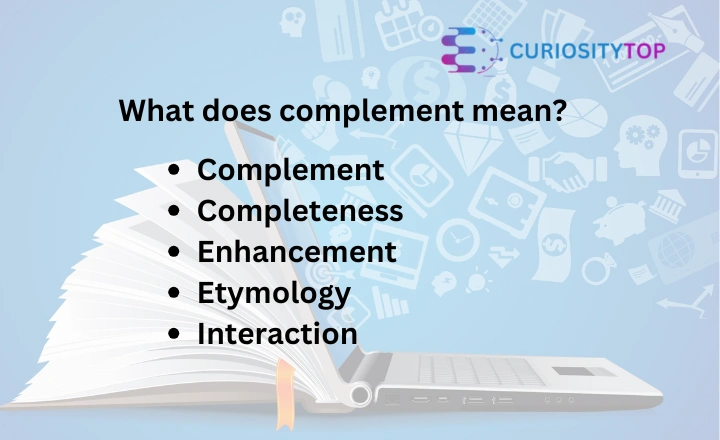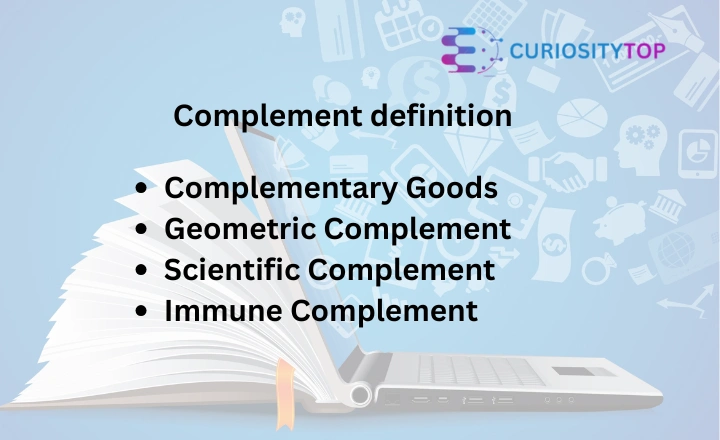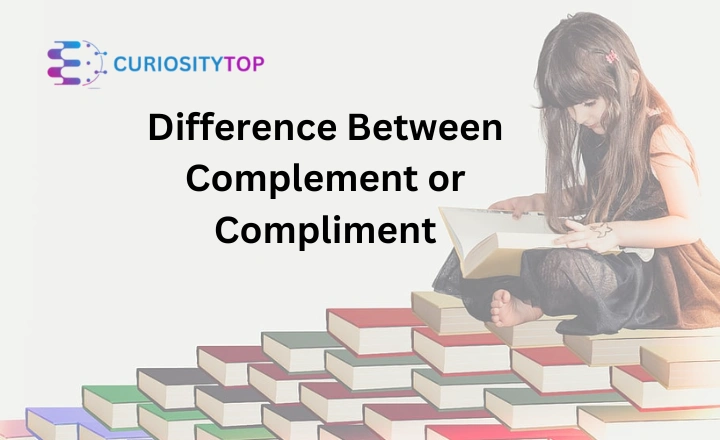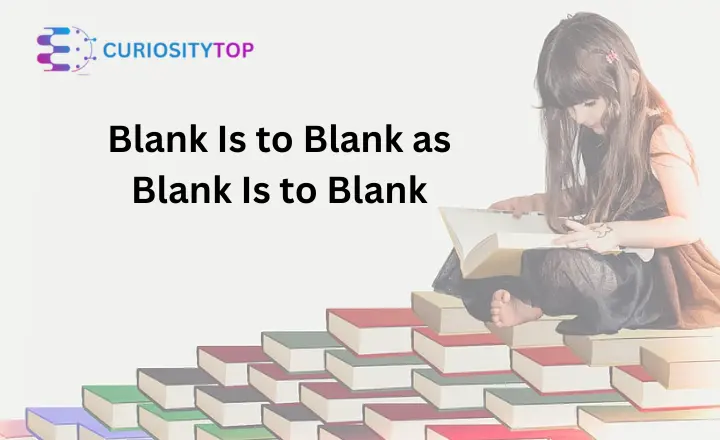Complement or Compliment: What’s the Difference?
In the vast landscape of the English language, two words often create confusion among writers and speakers: Complement or Compliment. These linguistic twins sound identical when spoken but carry distinctly different meanings. Understanding the difference between complement or compliment is crucial for clear and precise communication.
What does complement mean?

The word complement with an “e” boasts a rich linguistic heritage dating back to the 1300s. Originating from the Latin term complēmentum, meaning “something that completes,” complement or compliment in English reveals a fascinating etymological journey. In its essence, complement represents something that fills a gap, enhances, or makes another thing perfect.
When we discuss complement, we’re exploring the concept of completeness and enhancement. A shirt can complement the color of someone’s eyes, or a specific wine can complement a carefully prepared meal. The term extends beyond simple descriptions, finding significance in various domains like mathematics, color theory, and scientific disciplines.
In mathematics, complement appears through concepts like complementary angles – two angles that combine to create a perfect 90-degree angle. Color theorists use complement to describe colors directly opposite each other on the color wheel, which enhances each other through striking contrast. Scientific contexts, such as the complement system in biology, further demonstrate the word’s versatility in describing elements that complete or interact perfectly.
What does compliment mean?
Compliment with an “i” emerged in the mid-1600s, tracing its roots to the Spanish word cumplimiento. Interestingly, this term shares a common Latin origin with complement, which contributes to the ongoing confusion between these two words.
As a noun, a compliment represents an expression of praise, admiration, or recognition. When used as a verb, compliment means to offer genuine praise or acknowledge someone’s achievements or qualities. For instance, telling someone, “You look wonderful today” is extending a compliment. The phrase “compliments to the chef” after enjoying a delightful meal exemplifies this usage perfectly.
Something complimentary can also mean free, such as complimentary drinks offered by airlines or hotels. This additional meaning adds another layer to the word’s complexity, demonstrating how language evolves and adapts over time.
Complement vs compliment: What’s the difference?
Distinguishing between complement and compliment is essential for precise communication. Here’s a straightforward breakdown to help you understand their differences:
- Complement refers to something that completes or makes something else perfect. Example: Tomato sauce complements plain spaghetti.
- Compliment involves saying something nice or offering praise. Example: “You look nice this evening” is a compliment.
Both words can function as nouns and verbs, which further complicates their usage. Understanding their subtle distinctions prevents potential misunderstandings in written and spoken communication.
Complement definition

The complement compliment definition reveals a word that fundamentally means something that completes or perfects another element. This concept spans various contexts, from personal relationships to scientific and mathematical domains.
In relationships, personalities can be a perfect complement to one another. Economic theories describe complementary goods as items with little individual value but significant worth when combined. Geometric principles define a complement as the quantity an angle is short of 90 degrees.
The scientific realm provides fascinating examples of complement. The complement system in immunology refers to proteins circulating in the blood that interact specifically with antibodies, literally “completing” immune responses.
Complement as a verb
As a verb, to complement means to complete, provide something lacking, or form a perfect addition. Musical collaborations often demonstrate this beautifully: a violin can complement a piano, creating harmonious music that is more than the sum of its parts.
In professional settings, team members might complement each other’s skills, filling gaps and creating a more effective working unit. This usage emphasizes the word’s core meaning of completion and enhancement.
Complement synonyms
Several words capture the essence of complement:
- Addition: Something added to complete a whole
- Companion: A matching or complementary element
- Completion: The state of being whole or fulfilled
- Counterpart: One of two parts that complete each other
- Enhancement: Something that intensifies or raises value
- Makeweight: An element added to reach a desired total
Compliment definition
A compliment is an expression of praise, respect, or admiration. It can range from a simple, courteous greeting to a profound acknowledgement of someone’s qualities or achievements.
Literary examples illustrate the power of compliments:
- “To be trusted is a greater compliment than being loved.” – George MacDonald
- “I take no leave of you, Miss Bennet. I send no compliments to your mother.” – Jane Austen’s Pride and Prejudice.
Compliment as a verb
To compliment means to praise, congratulate, or express admiration. This can manifest through words, gestures, or gifts. A heartfelt “Well done!” or a sincere note of appreciation are classic examples of complimenting someone.
Compliment synonyms
Words related to compliment include:
- Flattery: Favorable comments, sometimes insincere
- Homage: Respectful acknowledgement, often public
- Praise: Expressing admiration or approval
How do you remember complement or compliment?
Remembering the difference can be simple:
- For complement: Think of “complete” – something that fills a gap
- For compliment: Associate with “I” for “impressive” praise
A helpful memory trick involves the letter “I” in compliment. When you give yourself a compliment, focus on the “I” – “I am smart” or “I did well” – which helps distinguish it from complement.
Complement or Compliment Usage
Complement Usage
The usage of complement extends far beyond simple linguistic applications. In professional and academic contexts, complement demonstrates its versatility across multiple disciplines. In business, complementary skills are crucial for team success, where individuals’ abilities fill each other’s gaps, creating a holistic and efficient workforce.
Scientific and technical fields rely heavily on the concept of complement. In biological systems, complementary processes ensure complete functionality. Mathematical applications showcase complement through precise calculations where components complete a whole. Economic theories explore complementary goods – items that derive value when used together, like printers and ink cartridges or hot dogs and buns.
Language professionals appreciate complement in grammatical contexts. In sentence structure, a complement completes the meaning of a subject or object, providing essential information that makes the communication comprehensive and precise. This linguistic application demonstrates how complement truly embodies its etymological roots of completion and enhancement.
Compliment Usage
Compliment usage permeates social interactions, serving as a powerful tool for building relationships and expressing appreciation. In professional environments, strategic compliments can boost morale, enhance team dynamics, and create positive communication channels. Cultural nuances play a significant role in how compliments are given and received.
Social etiquette guides the art of complimenting. Different cultures have unique approaches to offering praise, with some societies being more reserved and others more openly expressive. The context, tone, and sincerity of a compliment can dramatically impact its reception. A well-timed compliment can strengthen personal and professional relationships, while an inappropriate one might cause discomfort.
The psychological impact of compliments is profound. They can boost self-esteem, motivate individuals, and create positive emotional responses. From casual interactions to formal recognitions, compliments serve as a fundamental mechanism of social communication, bridging gaps and expressing genuine appreciation.
Complement or Compliment Grammar
Grammatically, both complement and compliment function as versatile parts of speech, serving as both nouns and verbs. This grammatical flexibility contributes to their frequent confusion.
As a noun, a complement describes something that completes or enhances another element. For example, “The wine was a perfect complement to the meal.” As a verb, it means to complete or improve: “These colors complement each other beautifully.”
Similarly, compliment as a noun represents praise or an expression of admiration: “She received many compliments on her presentation.” As a verb, it means to praise or express admiration: “He complimented her excellent work.”
The grammatical structures differ subtly:
- Complement often requires an object that is being completed
- Compliment typically involves praising someone or something
Learn more about Coach’s or Coaches’ or Coaches
Complement and Compliment Pronunciation
Pronunciation creates another layer of complexity in distinguishing these words. Despite their different spellings, complement and compliment are pronounced identically: /ˈkɒmplɪmənt/.
This phonetic similarity explains why many people struggle to differentiate between them in spoken language. The identical pronunciation means context becomes crucial in understanding which word is intended. Native speakers and language learners alike must rely on contextual clues to determine the correct usage.
Pronunciation tips:
- Focus on context when hearing these words
- Pay attention to surrounding words
- Consider the implied meaning of completion vs. praise
Compliment vs Complement Examples
Practical examples illuminate the distinctions between complement and compliment:
Complement Examples:
- “The blue scarf complements her eye color.”
- “These herbs complement the chicken’s flavor.”
- “Her analytical skills complement his creative approach.”
Compliment Examples:
- “He complimented her on winning the award.”
- “Receiving a compliment boosted her confidence.”
- “The chef received compliments for the exceptional meal.”
Contextual distinctions:
- Complement: Completing, enhancing, or making something whole
- Compliment: Praising, admiring, or expressing positive recognition
Conclusion
Language is a living, breathing entity that challenges and delights us. Mastering the subtle difference between complement and compliment transforms you from a casual communicator to a precise wordsmith. By understanding these nuanced terms, you unlock more accurate expressions, avoid potential misunderstandings, and demonstrate linguistic sophistication. Embrace the journey of learning, and let your words shine with accuracy and elegance.
FAQs
What is an example of complement and compliment?
Imagine a stylish scarf that perfectly matches a suit (complement) while someone warmly praises how amazing you look (compliment).
What does compliment mean?
It’s like giving a heartfelt thumbs-up through words, expressing genuine admiration or appreciation for someone’s talent, appearance, or achievement.
What’s the difference between complimentary and complementary?
Complimentary means praising someone or getting something free, while complementary describes things that beautifully enhance each other’s qualities.
When to use complement?
Use complement when describing something that wonderfully completes or adds depth to another thing, like perfect puzzle pieces fitting together seamlessly.







